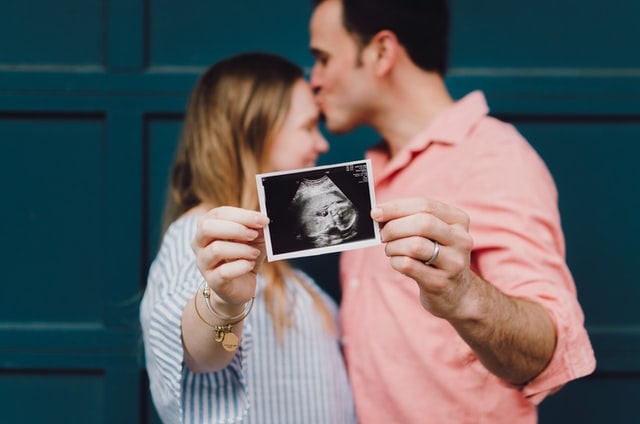
Is it safe to intermittent fast during pregnancy?
Intermittent fasting is generally not recommended in women who are pregnant. Although intermittent fasting has many proposed health benefits, it does not suit everyone. Certainly, not in pregnancy.
Keep reading to find out why and how intermittent fasting affects your pregnancy.
We will also recommend alternatives to fasting. For those who choose to fast, we have a handy checklist to help you do it right. You will also learn how to optimise your diet to maintain a healthy pregnancy.
What is Intermittent Fasting?
Intermittent fasting is exactly what the title suggests. You cycle between periods of fasting and eating, in a selected time-frame.
There are many ways this could be done but the easiest and most popular is the 16/8 schedule. This is where you eat for 8 hours of the day and fast for the rest of the day (16 hours).

Intermittent fasting is known for its ease of following. There are no real “rules” to this dietary approach, unlike typical diets. The only strict restriction is when you are allowed to eat.
How safe is Intermittent Fasting During Pregnancy
Intermittent fasting is not recommended to women who are pregnant because there is no guarantee that it is safe for both the woman and baby.
Why?
1. We do not know enough about this topic.
There is a lack of good quality evidence-based research studies around. No one wants to take the risk! Biologically, we know that fasting has the potential to do more harm than good to pregnant women.
Some studies look at Ramadan fasting during pregnancy for religious purposes. Believers eat two meals a day, before sunrise and after sunset. They fast for the rest of the day.

This is not the same as intermittent fasting.
Nevertheless, a study in 2014 has not shown that fasting causes significant adverse effects in pregnancy. Though, the results of this could be limited by small sample size.
All in all, don’t try to start fasting during pregnancy. Most religions give women who are pregnant a free pass to not fast. So don’t feel guilty about not being able to intermittent fast during this time! You can always fast later.
2. Pregnant women require more nutrients growing a baby
Feeding two humans mean MORE food and MORE calories!
Experts recommend that pregnant women should even start with 300 calories surplus even if they are not underweight.
Baby needs calories.
Any form of fasting involves calorie restriction, which is the opposite of what the woman and her fetus need.

Fasting in Stages of Trimesters
First Trimester
During the first trimester, the focus is on the growth of the baby.
But because in the early stages, the fetus is still underdeveloped. The calorie requirements are not as high yet. Therefore, it is not crucial to bulk at this point.
You could consume your normal calorie intake UNLESS you are underweight/ malnourished at the start of the pregnancy.
If you insist on intermittent fasting, the ‘safest’ time would be this semester, compared to the latter two. However, your body does go through the most changes in the first trimester- in both your appearance and physiology. It is best to take things leisurely.
In any case, you should ALWAYS consult your doctor before making any big changes to your diet.
Second Trimester
The second trimester is where baby’s growth is most rapid.
It is absolutely crucial at this point of the pregnancy to have enough nutrients on board.
Intermittent fasting at this time of pregnancy may be a strict no-go.
Nutritionists suggest that women require an additional snack in the evening and before sleep to stock up on nutrients. Some even eat upon waking.
Third Trimester

Safety of certain intermittent fasting schedules:
What kind of intermittent fasting schedule is recommended for pregnant women who insist to fast for religious, cultural or personal reasons?
The safest schedule is 12/12 according to Dr Shah, who was interviewed on MindBodyGreen. This is perceived to be the safest schedule as it is closest to “normal” eating and fasting periods.
It could even be beneficial for women doing 12/12 intermittent fasting, provided :
- It is a healthy pregnancy
- It is approved by an obstetrician or family doctor
- It is not in the later stages of pregnancy.
Any longer fasting periods than this e.g. the popular 16/8 and 5/2 schedules can be too extreme and are not recommended.
Risks of Intermittent Fasting During Pregnancy
There are many proposed health benefits to intermittent fasting.
- Weight loss
- Reduction in insulin resistance
- Reduction in blood sugar spike
- Management of type 2 diabetes
- Improvement in energy levels and mental clarity
- Increase in longevity

These effects are desirable in most people.
Pregnant women, unfortunately, do not benefit from these effects in the short term. Weight loss and rapid reduction in blood sugar could affect fetal growth and metabolism negatively.
What about the management of gestational diabetes? Don’t we want to lower blood sugar levels?
Yes, weight loss and blood sugar reduction are important in gestational diabetes.
But, pregnant patients are advised to make dietary changes under health professionals close supervision. This means choosing healthier foods to lower sugars. Not calorie restriction or fasting.
Morning sickness is a conundrum that often comes with pregnancy. To top this, pregnant women also have slower digestive systems.
With the gut slowing down, it is recommended to have frequent smaller meals to aid digestion i.e. SNACK. Intermittent fasting is the opposite of this! The fundamental of this diet is based on long hours of fasting to burn fat and advises against eating regularly.
This diet approach also leads to bigger portion meals which can worsen nausea and morning sickness. Not ideal.

Can I continue intermittent fasting if I already did it before pregnancy?
Pregnant women should stop intermittent fasting and resume normal eating times.
This maintains stable blood sugar levels throughout the day which is more desirable for the baby to thrive.
Trying to get Pregnant while Intermittent Fasting?
Overweight and obese patients may experiences irregular menstrual cycles thus difficulty with ovulation. Some may be diagnosed with PCOS (Polycystic Ovarian Syndrome). It is associated with reduced fertility.
The first-line treatment of PCOS is to achieve healthy weight loss which can restore ovulation cycles and reduces infertility risk.
Intermittent fasting is a great way to achieve weight loss and improve fertility.
It is important to not overdo it though!
Hormonal imbalances occur at either end of weight extremities. An unhealthy weight loss and low body mass index can cause problems like anorexia. Patients with anorexia often have no periods due to hormonal imbalance, resulting in infertility.
Try starting with gentler intermittent fasting regimes. The 16/8 is popular and easy to follow.
You should stop intermittent fasting when you find out you are pregnant.

What About After Pregnancy?
Women can recommence intermittent fasting at the end of pregnancy. There are no barriers to doing this other than… being slightly unkind to yourself.
It is important to take it easy as you have literally just given birth. Women are prone to get post-natal depression. It is already stressful as it is looking after a newborn!
If intermittent fasting is not benefiting you and is causing more stress to stick to it, don’t do it!
There is always a better time to do it.
Intermittent Fasting While Breastfeeding
Mothers who breastfeed often require more calories than in pregnancy itself. A rough estimate is 400-500 calories surplus.
Due to the higher need for calories, fasting is generally not recommended.

It is agreed by many experts that fasting no longer than 1 day should not affect milk production. Anything longer could risk producing less amount of milk and compromise the baby’s growth.
So if you want to intermittent fast while breastfeeding, choose regimes that fast less than 24 hours.
Keep hydrated while breastfeeding. This is even more important if you intermittent fast.
Avoid rigorous exercise while breastfeeding as this risks burning too many calories unintentionally.
As mentioned, the stress-free way is to avoid fasting at all and be kind to your physical and mental health during this special time.

What if I still want to intermittent fast during pregnancy?
If you have decided to fast during pregnancy, despite all the spiel above, read the checklist below!
- Discuss with a health professional before fasting.
- Avoid long fasting hours. 12 hours max!
- Keep hydrated.
- Have a nutritious diet.
- Listen to your body.
Pregnancy is no walk in the park! The body is undergoing big changes to accommodate another human being in the body.
DISCLAIMER: While intermittent fasting has many proven health benefits, fasting during pregnancy is a completely different ball game. Consult your doctor before changing your eating habits during pregnancy.
Diet Tips for A Healthy Pregnancy
Instead of intermittent fasting, eat a well-balanced diet. Your generic “eat healthy” diet advice applies – there is no special tips or tricks!
Steer clear of cold or raw food though. This is due to the risk of catching nasties like Listeria and Toxoplasmosis.
ALSO, avoid junk food that consists of refined sugars or processed food.
Take home message
Fasting is not recommended in pregnancy.
It is suggested that pregnant women do the opposite of intermittent fasting! Snacking frequently is encouraged instead of intermittent fasting and consuming big meals.

There is plenty of time outside of your pregnancy to try intermittent fasting. Just hold out for 9 months!
If you do want to intermittent fast while pregnant, please speak to your doctor first.
Pingback: Intermittent Fasting Weight Loss for Women - Doctor Chou